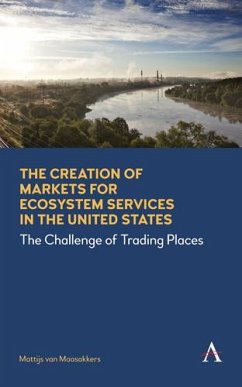The Creation of Markets for Ecosystem Services in the United States is a detailed analysis of the most advanced efforts to create markets for ecosystem services in the United States. With the help of in-depth case studies of three well-known attempts to create such markets--in the Chesapeake Bay watershed, the Ohio River basin and the Willamette River basin--the book explains why very few of these markets have actually succeeded even after close to two decades of much scholarly enthusiasm, significant federal funding and concerted efforts by NGOs, government agencies and private businesses.
Based on interviews, policy analysis and participatory observation, three features of markets for ecosystem services emerge as particularly problematic. First, the logic of displacement or the idea that particular elements of an ecosystem can be separated and traded across landscapes or watersheds runs counter to political interests, environmental beliefs and people's connections to specific places. The second problem is that of measurement. Quantification methods embed a range of often contentious assumptions and decisions about what counts when restoring ecosystems. The third problem is related to participation in environmental decision-making.
Based on interviews, policy analysis and participatory observation, three features of markets for ecosystem services emerge as particularly problematic. First, the logic of displacement or the idea that particular elements of an ecosystem can be separated and traded across landscapes or watersheds runs counter to political interests, environmental beliefs and people's connections to specific places. The second problem is that of measurement. Quantification methods embed a range of often contentious assumptions and decisions about what counts when restoring ecosystems. The third problem is related to participation in environmental decision-making.
Dieser Download kann aus rechtlichen Gründen nur mit Rechnungsadresse in A, D ausgeliefert werden.









